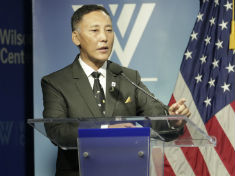-
An Unlikely Ambassador: Ghana Gurung on Snow Leopards and Community Resilience
November 24, 2017 By Gretchen Johnson As a child growing up in Nepal’s mountainous Upper Mustang region, Ghana Gurung understood that his survival depended on the mountains and his community. Today, as senior conservation program director at World Wildlife Fund-Nepal, he works to protect the endangered and elusive snow leopard by improving local communities’ livelihoods and the mountains’ ecosystem.
As a child growing up in Nepal’s mountainous Upper Mustang region, Ghana Gurung understood that his survival depended on the mountains and his community. Today, as senior conservation program director at World Wildlife Fund-Nepal, he works to protect the endangered and elusive snow leopard by improving local communities’ livelihoods and the mountains’ ecosystem.As a child growing up in Nepal’s mountainous Upper Mustang region, Ghana Gurung understood that his survival depended on the mountains and his community. Today, as senior conservation program director at World Wildlife Fund-Nepal, he works to protect the endangered and elusive snow leopard by improving local communities’ livelihoods and the mountains’ ecosystem.
“Survival of the snow leopard is…important for our own survival,” Gurung says in a podcast of his remarks at a recent panel discussion, “Securing the Third Pole: Science, Conservation, and Community Resilience in Asia’s High Mountains,” at the Wilson Center. He didn’t always believe this. As he herded his families’ goats, Gurung knew that in the harsh mountain climate, livestock is livelihood. When a snow leopard attacked and ate his goats, he was angry: “A loss of one animal is a loss of your economy, cash in the bank,” he says. But through his Buddhist faith and his ecological education, he came to see the important role played by snow leopards; as an umbrella species, the leopards are a top predator and indicate the overall health of the ecosystem.
Climate change also threatens the snow leopard and its habitat, says Gurung. The tall grasses of his youth are now degraded, as are the habitats that support wild blue sheep, the snow leopards’ primary prey. “It’s not only wildlife and ecosystem that suffers; it’s people [that] suffer a lot,” says Gurung. To adapt to the changing climate, people are resettling alongside riverbeds that are vulnerable to flooding. And more catastrophically, water from melting glaciers could potentially impact billions of people downstream. Just a few months ago, one day of rain flooded 300,000 households.
Climate change knows no political borders, and neither do snow leopards. They can travels more than 2,000 kilometers between countries, said Gurung. Twelve countries have joined together to create the Global Snow Leopard and Ecosystem Protection Program, a global forum that brings together “countries that don’t normally sit side-by-side to talk too much in political terms,” says Gurung. But the snow leopard—acting as an “ambassador”—brings them together, he says.
“You can call it adaptation, or you can call it mere survival strategies,” Gurung says of community-based efforts to protect snow leopards. For example, citizen scientists from local Sherpa communities set up camera traps, collect scat for DNA analysis, and help put radio collars on the the cats. “It’s not all about ecology of conservation for snow leopards, it’s about community,” he says. “The community holds the key to the survival of the species.”
Ghana Gurung spoke at the Wilson Center on October 23, 2017.
Sources: Global Snow Leopard, Relief Web, World Wildlife Fund
Friday Podcasts are also available for download on iTunes and Google Podcasts.
 A Publication of the Stimson Center.
A Publication of the Stimson Center.

 As a child growing up in Nepal’s mountainous Upper Mustang region, Ghana Gurung understood that his survival depended on the mountains and his community. Today, as senior conservation program director at World Wildlife Fund-Nepal, he works to protect the endangered and elusive snow leopard by improving local communities’ livelihoods and the mountains’ ecosystem.
As a child growing up in Nepal’s mountainous Upper Mustang region, Ghana Gurung understood that his survival depended on the mountains and his community. Today, as senior conservation program director at World Wildlife Fund-Nepal, he works to protect the endangered and elusive snow leopard by improving local communities’ livelihoods and the mountains’ ecosystem.

